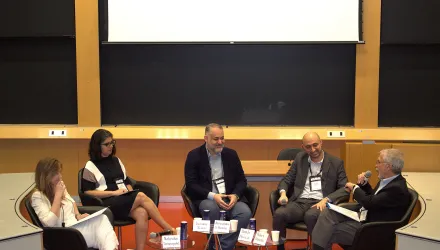BCSIA: 1978-1979 ANNUAL REPORT
5. Other Program Activities
OTHER PROGRAM ACTIVITIES
"Technology, War, and Peace"
In the fall semester fifty-eight students were enrolled in the course which was offered by the Center for the fourth consecutive year and co-sponsored by the Office of General Education and the Kennedy School of Government. It was taught by Professors Carnesale and Nacht, and two CSIA graduate students acted as teaching fellows. The course received one of the highest ratings in the Harvard Undergraduate Course Evaluation Guide. The subjects of the lectures were as follows:
1. Contemporary Issues
2. Historical Perspective
3. Development of the Atomic Bomb
4. The Atomic Bomb and World War II
5. The Cold War and Attempts to Control the Bomb
6. Political-Military Implications of Nuclear Weapons
7. First Steps in Arms Control
8. Strategic Forces
9. Strategic Doctrine
10. Limited War in Theory and Practice
11. McNamara and the Whiz Kids
12. Medium Nuclear Powers
13. MIDTERM
14. Technology and Conventional War
15. Conventional Arms Transfers
16. Alliance Politics and European Security
17. SALT I: Context and Agreements
18. SALT II and Beyond
19. OPEN
20. Soviet-American Relations
21. New Dimensions of National Security
22. Nuclear Energy
23. Nuclear Proliferation
24. The Future of Arms Control
25. REVIEW
Working Groups
Three working groups, in which members of the CSIA research staff and other interested individuals in the Cambridge community engaged in collaborative work on topics of mutual interest, were active this year.
The Domestic Politics and Security Policy Working Group, led by Michael Mandelbaum, met on a regular basis to review papers written by individual members of the group. Papers were written on U.S. intervention in Siberia, the balance of power in the nuclear age, the Soviet view of SALT, United States policy in Korea, the case for balance in NATO forces, Soviet research and development, and a comparative analysis of nuclear weapons and chemical and biological weapons. These papers are expected to be published as separate articles or as book chapters.
The Nonproliferation Working Group, led by Onkar Marwah assessed frameworks for a comprehensive nonproliferation strategy to follow the deliberations of the International Nuclear Fuel Cycle Evaluation. Participants categorized major themes in the supplier-recipient nonproliferation debate and considered the significance of technical, political, and bureaucratic initiatives on the responses of supplier and recipient states.
The Strategic Arms Control Working Group, led by Michael Nacht, concentrated on the land-based missile vulnerability problem. Papers were prepared on strategic vulnerability in the past; the evolution of the U.S. ICBM force; assets and liabilities of land-based missiles; and the present and projected threat to the U.S. ICBM force. In addition, a number of short papers were written which examined various options to alleviate the problem. These included: no changes in the force structure; shifting reliance to sea-based forces; alleviation of the problem through arms control negotiations and agreements; the doctrine of launch under attack; airborne ICBMs; ballistic missile defense; and several others. It is anticipated that some of these papers will be published in journals in revised form.
Table of Contents:
OverviewOrganization and Personnel
Research and PublicationsSeminars Other Program Activities Related Professional Activities Former Members of the Research Staff
The full text of this publication is available in the link below.



